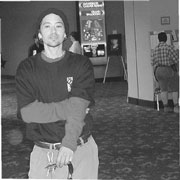Aside from the fact that he gave birth to an adorable little boy almost two years ago, Matthew Rice is that scruffy, sarcastic sci-fi geek who fixes your computer at work. Along with his partner, author-activist Patrick Califia-Rice, he lives a fairly ordinary life as a man in the Bay Area, although, like many transgendered males, he has not undergone any surgery on the lower half of his beefy frame. His personal interpretation of masculinity doesn’t please everyone and has drawn truly ugly vitriol from other, more stringent FTMs (Female-to-Males).
“‘Real men don’t have babies; real men have hysterectomies,’ is their mind-set,” Rice explains, still incredulous. “What?!! It’s an organ that’s in my body, it doesn’t change how I identify, you know?”
This business of identity in the 21st century is an increasingly ambiguous one. What was most apparent at the “FTM 2001,” a national conference for “female-bodied, male-identified people” held at the Doubletree Hotel near Sea-Tac Airport in May, was how steadfastly the community must deal with gender and masculinity—fluid, mysterious concerns that can rattle often nervously liberal lesbians and gays. In this month of supposed pride, does the trans community feel included? Can they?
“The difficulty is we’re treated like a stepchild,” observes Hawk Stone, a cherubic, middle-aged FTM who works as a therapist in Albany, N.Y. “Sometimes we’re paid attention to because it’s politically expedient to do so, and sometimes we’re ignored because we’re an ’embarrassment.’ I think [it’s] because the gay and lesbian community has issues around its own gender expression.”
Aidan C. Key, the conference’s coordinator, describes the reaction he’s received from lesbians in his inner circle since making his transition about four years ago. “Some of them have felt that I took their hard work and their agony and their times of fighting just to live and be a butch dyke . . . and [that I] said, ‘You know what? Your struggle wasn’t worth anything, and it’s just easier for me to go on living as a man.’ And that hasn’t been the case at all.”
Max, who, as both a clinical psychologist from California and an FTM, has also seen the debate through others’ eyes, notes that “any individuals who have really struggled with feeling proud of who they are [have] a fear that it could be taken away.” He cites a recent example on the professional front: “I just went to a state psychological conference. [There were] these folks who had drafted the standards of care for the American Psychological Association on how therapists should respect and treat gay- and lesbian-identified individuals. And their response to adding a ‘T’ [for transgendered] to that is, ‘We have worked so hard to just get this accepted, we are not about to go that step further at this particular point in time.’ I think probably some people do feel resentment and even just confusion: ‘What does all this mean?'”
Pride in our separate identities—as gays, as lesbians, or however we’ve accepted ourselves—is certainly a positive force. It’s that pride that carries any oppressed group above the ashes and tears of history. But many at the conference pointed out that the labels that give us strength and visibility can also box us in.
“We get too contained in those boxes and we forget the common ground that we have with other segments of the community,” Stone points out. “And I also think that, for some reason, due to transphobia, gay people think that we will slow down their civil rights movement. And the dirtiest little secret about that is that the straight world lumps us all together anyway.”
Perhaps the great lesson to draw from all this is that we’re all just thinking too damn much, and that our emancipation in life—everybody’s emancipation—hinges not so much on identity and pride as on just being—freely, calmly, and without political comment.
“I definitely identify as . . . I don’t know. It’s too complicated these days,” Matthew Rice laughs, then reconsiders. “I’m a lot of things. I have a lot of different friends in very diverse communities. Not all of my friends are white, middle-class computer geeks. In fact, very few of them are. And the ones that are, you know, are probably twisted in some other fabulous way. I’m not 100 percent real man, and I don’t feel at all threatened by that because I know lots of queens who are not 100 percent real man, thank you very much. And they’re just fine. I don’t spend a lot of my time thinking about sex and gender. I just kind of live my life. And that’s good.”








